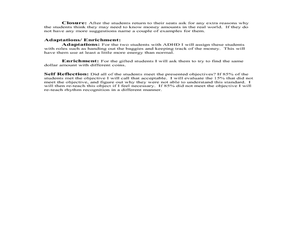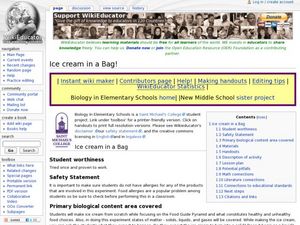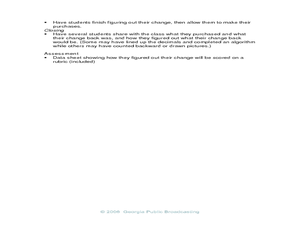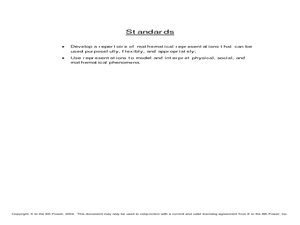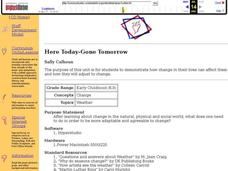Curated OER
You Are What You Wear
Students, after analyzing interactions between groups/societies, effects of causality/change over time, forms of imaginative writing and utilizing art media to conveying messages/meaning, examine the relationship between clothing and...
Curated OER
Changes In Change
Learners research the changes in change over time. Students choose one coin to research and trace in history. Learners graph out a time line on their coins. Students present their time lines to the class.
Curated OER
The Changing Times of My Life
First graders discuss different milestones in their life such as bathing, dressing, eating, walking, etc. They brainstorm ideas of how the changes affected their life from the moment they occurred to the present. Students brainstorm and...
Curated OER
What's for Lunch?
In this money word problem worksheet, 5th graders solve and complete 6 different problems that include determining the cost of food for lunch. They determine which meal goes to which customer first. Then, students use the information...
Curated OER
Exploring Environmental Change
Students examine environments and how the impacts human activities can cause. In this environmental change lesson students research how human activity is causing local environmental changes.
Curated OER
The Dollar Bill Problem
In this dollar bill problem, high schoolers explore the number of combinations that can be used to make change for a dollar. This one-page problem contains 1 problem. The solution is provided at the bottom of the page.
Curated OER
Your Genes: Your Future
Students examine different healthy behaviors and choose one of their own that they would like to change or improve. In this healthy lesson students write a letter to themselves that they are going to make a change and why it is...
Curated OER
Making Amounts with Money
Second graders discuss how to make correct change. In this lesson on money, 2nd graders practice making an amount using the correct number of coins.
Curated OER
Holiday Shopping
Fourth graders find change for an amount given. In this real life subtraction lesson plan, 4th graders use an advertisement to select items to "buy." They figure out how much money they would pay the cashier and how much money they will...
Curated OER
Perception Propaganda
Eleventh graders explore the various uses of perception, propaganda, and perspective. In this Social Studies lesson, 11th graders distinguish between fact and fiction. Students analyze the impact of conflict on society.
Curated OER
States of Matter
First graders experiment with different states of matter in order to observe the changes in matter. In this states of matter lesson plan, 1st graders see and explain how solids, liquids, and gases change.
Curated OER
Ice Cream in a Bag
Learners observe phase change of matter by making ice cream in bags. In this states of matter lesson plan, students work in pairs to churn their own ice cream in plastic bags. They make predictions about how long it will take for the...
Curated OER
Spending - Maintaining the skill of money
Third graders practice making change with money. In this subtraction instructional activity, 3rd graders watch a video about money. Students investigate what it means to earn money, spend it, and find their change.
Curated OER
Changes in Latitudes, Changes in Attitudes
Sixth graders discuss how people, society, and technology change over time through a unit of integrated lessons. In these changes in society lessons, 6th graders discuss the answers to many questions about how changes effect the...
Curated OER
Count, Compare and Make Change
Second graders review the value of coins and how to make change. In this counting money lesson, 2nd graders compare coins, practice making change, and review the value of coins using hands-on activities.
Curated OER
Decimal Word Problems
In this decimals worksheet, students solve 10 different word problems that include using decimals. First, they determine the amount of change received from a cashier given a specific amount. Then, students write a decimal representing...
Curated OER
What's your Change?
In this money problems worksheet, 6th graders solve 20 different problems that include money and change. First, they determine the cost of each item illustrated in the box. Then, students determine how much money they have to spend for...
Curated OER
Chapter 4 Word Search
For this math worksheet, students locate and identify various vocabulary terms related to mathematics. There are seven words located in the puzzle to find.
Curated OER
The More Things Change
Second graders discuss change in cities over time. They view pictures of a city as it has changed over time and then compare city pictures of the past to those of a modern city today. In preparing for a guest speaker who will come and...
Curated OER
Explorers (Early European)
Young scholars research and explore the past and its historical roots involving the economic motivations of early European explorers. They assess connections between the current technological advances in transportation and that of the...
Curated OER
The More Things Change...
Young scholars participate in a mock town hall meeting after researching issues relating to fishing rights. After reading The Lorax, they discuss the importance of conserving natural resources. In partners, they write a story of their...
Curated OER
Conceptual Change: The History of Thanksgiving
Twelfth graders investigate how to analyze, question and debate the validity of the information given to them from teachers, text books, the media and their peers. The purpose of this lesson is to foster a true understanding about the...
Curated OER
Here Today-Gone Tomorrow
Students explore changes and how to adapt to them. They discuss the seasons, changes in the weather, and different stages of matter. Students write a poem about change. Additional cross curriculum activities are listed.
Curated OER
From Crowded Classrooms To Broken Streetlights: Exploring Ways To Effect Change in Our Communities
Students discuss issues of concern to their communities and explore the variety of avenues available for concerned community members to address these issues and effect change.









